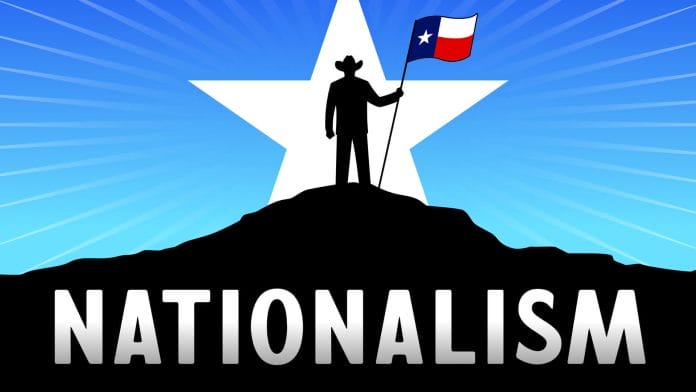If you are offended by the word “nationalist,” there are only two possibilities. Either you are a globalist, or you don’t truly comprehend how big the fight for our freedom really is.
Sitting right smack in the middle of the name of the organization to which I have given the last 17 years of my life is a word that has been maligned by those who oppose everything I, and most other Texans, value dearly. The truth is that some people have a freakish aversion to the word “nationalist” that borders on a phobia.
At a recent speaking engagement, I stood in the hotel lobby before I spoke and was advised that “some people in the room don’t like the word nationalist, so you might want to get out in front of it.” Not once at the speaking engagement did the word “nationalism” or “nationalist” come up other than when the host introduced me. No questions or objections were raised after my remarks when attendees had every opportunity to take me to task over the word.
The people in the room, it turned out, were excited about the idea of independence and its implications for their future. That vision of the future was predicated on Texas becoming a self-governing and independent nation. In that moment, as in many moments throughout the last 17 years, the room became full of newly self-aware Texas nationalists.
Often those who seem to raise the greatest alarm over the word don’t even understand what it means. Cambridge Dictionary defines nationalism as “a nation’s wish and attempt to be politically independent” or “the feelings of affection and pride that people have for their country.” It even adds, “Nationalism is also the desire for political independence in a country that is controlled by or part of another country.”
Even CNN had to acknowledge that the term itself is innocuous in an article from October 23, 2018, aptly called “The definition of a nationalist”. The article was prompted by then-President Donald Trump’s admission at a rally in Texas that he was a nationalist. “You know what I am? I’m a nationalist. Use that word,” he said to the crowd of thousands.
While the pearl-clutching political elite and their less-than-courageous cheerleaders in the media went into full meltdown over Trump’s public admission, no one else seemed to mind. In fact, for them, the word perfectly described what they felt. They were tired of seeing their interests and concerns placed on the back burner and other nations, countries, and political entities given precedence.
Do you know who else didn’t mind his use of the word? The rest of the world didn’t bat an eye since nationalism is the status quo for every single self-governing, independent nation in the world. It has been the single dominant political force in the world over the last 75 years, with an explosion of over 140 new nation-states asserting their nationalism and gaining their independence. We see political parties around the world all across the political spectrum that use the word “nation,” “national,” “nationalist,” or “nationalism” in their names or their platforms.
To understand the perceived stigma when nationalism is so common, you only need to look at its counterpoint – globalism.
Unlike nationalism which takes on the flavor of the nation where it is expressed, globalism is a singularly defined ideology. It is easy to think of globalism as merely the opposite of nationalism, but its ideology goes far deeper, and its adherents are far more dangerous than any nationalist ever could be.
Aaron M. Renn, a Senior Fellow at the Manhattan Institute for Policy, defined globalism as a worldview with four key elements – a borderless world, a global set of social and political norms that supersede all national norms and institutions, a belief that every decision made is weighed against its effect on the world without regard to your neighbors or countrymen, and the view that humans are nothing more than “widgets” that can be viewed similarly to goods or services.
We have all witnessed the destructive effects of globalism and globalist policy. The globalist ideal of a borderless world is at the heart of the federal government’s actions on the southern border, creating an unprecedented public safety, humanitarian, and national security crisis. Globalist policies have turned a blind eye to the purchases of strategically-located land in Texas by frontmen for the People’s Liberation Army of China. Globalism has turned the economy on its head, opened up our schools as indoctrination centers, and destroyed energy independence in the name of sustainability.
To globalists, you are no longer human and, therefore, you either accept your role as a pawn in their game or you are taken off the board.
While globalism may not be the exact opposite in meaning to nationalism, they are natural enemies. For globalism to be realized, nationalism must die. Globalists hate the very concept of the nation-state. This is why they demonize it. This is exactly why nationalism must exist and has triumphed over globalism for decades.
For our part as Texas nationalists, there should be no shame in our name. Either we embrace our Texas nationalism, or we surrender to the federal system and, by default, the globalism they spread. It’s that simple.
I acknowledge that there are those among us who would prefer that we change our name to something a little more “touchy-feely”. Much like Christians who will never deny Christ and would never consider calling themselves anything other than Christians to appease persecutors, we Texas Nationalists will never deny what we are, what we stand for, or what we do. We believe that Texas should be a self-governing, independent nation among nations. And that, friends, is a hill I will die on.

